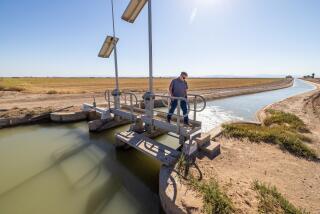OJAI : Growers Seek Water for Hilly Areas
- Share via
Angry Ojai Valley citrus and avocado growers want to irrigate hilly land that the federal government declared in 1953 was not suitable for farming.
The Casitas Municipal Water District has agreed to do a study of hundreds of acres from Ventura to Carpinteria, some of which is now being farmed. But officials warn that even if the federal government designates the land as suited for farming as a result of the study, growers won’t get a drop more of water from the Casitas Municipal Water District to irrigate it.
Many farmers bought land and received Casitas water, despite the district’s original agreement with the federal Bureau of Reclamation not to serve the hilly land. District officials, who said they were unaware of the violations, stopped new water service to those lands last year.
Casitas Pass avocado grower Chuck Starn of Ventura said the water district is responsible for the growers’ dilemma. If the district doesn’t petition the Bureau of Reclamation to have the land designated as suitable for farming, he said, the value of land he has farmed for 12 years will plummet.
“It’s important to realize the land out there is quite valuable,” Starn said. “A lot of farmers are probably producing $4,000 an acre after expenses.”
The Casitas position is that there is no more water for irrigation of more land, said John Johnson, district general manager.
Customer demands on Lake Casitas, a federal Bureau of Reclamation project, have increased beyond the point where the district’s water shortage can be blamed on the drought, Casitas officials have said.
Only reduced consumption or new supplies will improve the situation, even if heavy rains were to fill the lake, Johnson said.
But at least a dozen farmers have asked the Casitas district to petition the Bureau of Reclamation to change land-use designations. The bureau undertakes such reviews once every five years.
Drip irrigation and erosion controls have outdated the old designations, the growers say.
About 20% of the 150-square-mile Casitas district is classified as unsuitable for farming.
More to Read
Sign up for Essential California
The most important California stories and recommendations in your inbox every morning.
You may occasionally receive promotional content from the Los Angeles Times.













